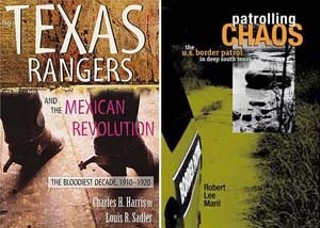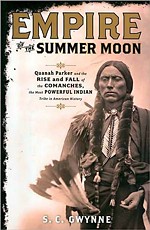Book Review: Readings
Two new books about Texas explore a little bit of the deeper, darker, and less obvious parts of our history and culture
Reviewed by Ed Baker, Fri., Jan. 14, 2005

The Texas Rangers and the Mexican Revolution: The Bloodiest Decade, 1910-1920
by Charles H. Harris III and Louis R. Sadler
University of New Mexico Press, 687 pp., $37.50
Patrolling Chaos: The U.S. Border Patrol in Deep South Texas
by Robert Lee Maril
Texas Tech University Press, 368 pp., $34.95
For a long time, reading Texas history has been equivalent to reading Texana: Texas history has been limited to the kind of books about Texas sold at the airport. Even the hagiography is big in Texas, but there has been a slow movement away from all of that.
Two new books about Texas explore a little bit of the deeper, darker, and less obvious parts of our history and culture: The Texas Rangers and the Mexican Revolution and Patrolling Chaos: The U.S. Border Patrol in Deep South Texas. The latter presents a sociological history of the border patrollers in Texas. It picks up the story of outsider policing within the Rio Grande Valley after the dissolution of the original Texas Ranger force and the departure of U.S. Army units (temporarily, as it turns out) following the first World War.
The book sets its tone by quoting Bob Dylan's "All Along the Watchtower," which is quite the revolutionary paean for Lubbockites, and keeps on with its breathless Miami Vice-meets-sociological-history-book feel. Three sections – "All Along the Watchtower," "Rocking and Swaying," and "The Substance of Chaos" – divide the vignettes.
To the book's great benefit, it addresses the history behind the many intriguing tales of the border patrol. It discusses why the agents act like they do, and it isn't afraid to explain things like the 20th-century serfdom of deep South Texas. The barely masked bossism of Jim Wills, Archie Pharr, Lloyd Bentsen Sr., and the other patrones created thriving agricultural and real estate fiefdoms that lasted well into the 1980s. These interests are or were maintained mostly by privately reaping the benefits of publicly owned resources, like water, and determining the workings of the ostensibly federal border patrols, which in turn determines much of the flow of inexpensive labor from Mexico.
The Texas Rangers book addresses a much darker part of state history with much less criticism. It compiles newspaper articles and official correspondence from 1890 to 1920 to discuss the Rangers and their roles in the border conflicts and in quite a few massacres of the period, along with the occasional Industrial Workers of the World Wobbly lynching for the railroad or liberal editor head-bashing for the governor.
The book treats an almost unending flow of these two-fisted incidents, but in shallow detail and without yellow-bellied introspection. To its detriment, the author rarely ventures beyond quoting contemporary Anglo newspaper accounts and Texas Ranger official monthly reports. But then again, with more than 600 pages of atrocities, the author might have intended that Spanish language sources, and sociological implications, best be explored by his readers or by other authors. The book certainly moves away from boring Texana, but somehow manages to present this sorry lot without any criticism, something that may, depending on the type of history writing you prefer, be a relief. It certainly is a thorough introduction to the real history of the Texas Rangers, and is a release that one likely won't find for sale at the airport.
Don DeLillo will do a reading at the University of Texas Jessen Auditorium on Thursday, Feb. 10, 7:30pm. Although the event sponsored by the centers Michener and Ransom is free, admission does require a ticket, which can be found on Tuesday, Jan. 18, at www.hrc.utexas.edu or by calling 232-3666.










